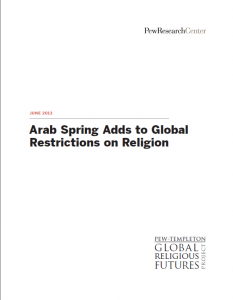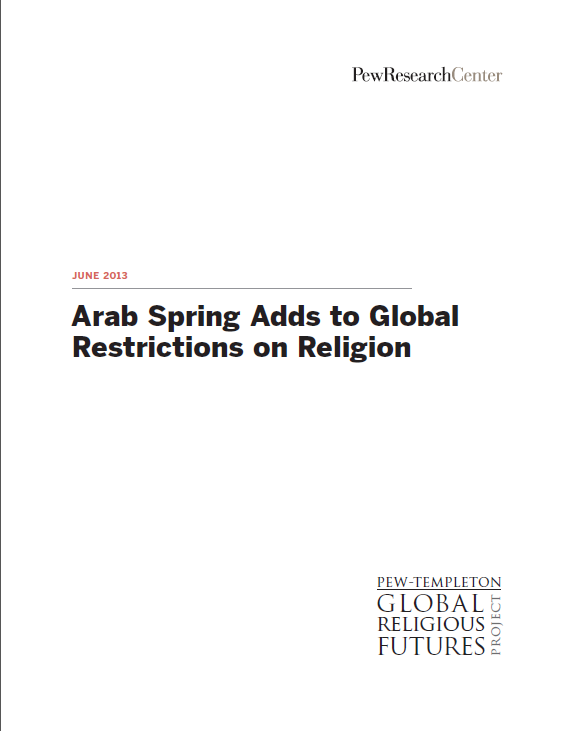 At the onset of the Arab Spring in late 2010 and early 2011, many world leaders, including U.S. President Barack Obama, expressed hope that the political uprisings in the Middle East and North Africa would lead to greater freedoms for the people of the region, including fewer restrictions on religious beliefs and practices. But a new study by the Pew Research Center finds that the region’s already high overall level of restrictions on religion – whether resulting from government policies or from social hostilities – continued to increase in 2011.
At the onset of the Arab Spring in late 2010 and early 2011, many world leaders, including U.S. President Barack Obama, expressed hope that the political uprisings in the Middle East and North Africa would lead to greater freedoms for the people of the region, including fewer restrictions on religious beliefs and practices. But a new study by the Pew Research Center finds that the region’s already high overall level of restrictions on religion – whether resulting from government policies or from social hostilities – continued to increase in 2011.
Before the Arab Spring, government restrictions on religion and social hostilities involving religion were higher in the Middle East and North Africa than in any other region of the world.1 Government restrictions in the region remained high in 2011, while social hostilities markedly increased. For instance, the number of countries in the region experiencing sectarian or communal violence between religious groups doubled from five to 10. (See sidebar on the Middle East-North Africa region.)
The Americas, Europe, sub-Saharan Africa and the Asia-Pacific region all had increases in overall restrictions on religion in 2011. Government restrictions declined slightly in Europe, but social hostilities increased. Asia and the Pacific had the sharpest increase in government restrictions, though the level of social hostilities remained roughly the same. By contrast, social hostilities edged up in sub-Saharan Africa, but government restrictions stayed about the same. Both government restrictions and social hostilities increased slightly in the Americas.
The new study also finds that reports of harassment or intimidation of Muslims increased worldwide during 2011. Muslims were harassed by national, provincial or local governments or by individuals or groups in society in 101 countries, up from 90 countries the year before. Christians continued to be harassed in the largest number of countries (105), although this represented a decrease from the previous year (111 countries). Jews were harassed in 69 countries, about the same as the year before (68). (For details, see Number of Countries Where Religious Groups Were Harassed, by Year chart.)
The number of countries with overall increases in restrictions compared with the previous year outnumbered those with decreases. However, a larger share of countries (35%) had a decrease in at least one of the 20 types of government restrictions or 13 types of social hostilities measured by the study compared with the previous year (28%). Examples include a relaxation of registration requirements for religious groups in Austria; efforts to overturn a centuries-old law barring the British monarch from marrying a Catholic; and elimination of a requirement in Jordan that groups, including religious groups, obtain prior permission from the government before holding public meetings or demonstrations.6 (See sidebar on initiatives aimed at reducing religious restrictions.)
In the four countries with decreases of 1.0 to 1.9 points (Bangladesh, New Zealand, Sri Lanka and the United States), some hostilities that occurred in the year ending in mid-2010 did not reoccur in 2011. In the United States, for instance, multiple religion-related terrorist attacks occurred in the year ending in mid-2010, but none occurred in 2011.15
Among countries with small changes on the Social Hostilities Index (less than 1.0 point), 69 had increases (35%) and 59 had decreases (30%).
Considering all changes in social hostilities from mid-2010 to the end of 2011, regardless of magnitude, 49% of countries had increases and 32% of countries had decreases. The level of increase in social hostilities during the latest year studied remained unchanged from the previous year (from mid-2009 to mid-2010).






